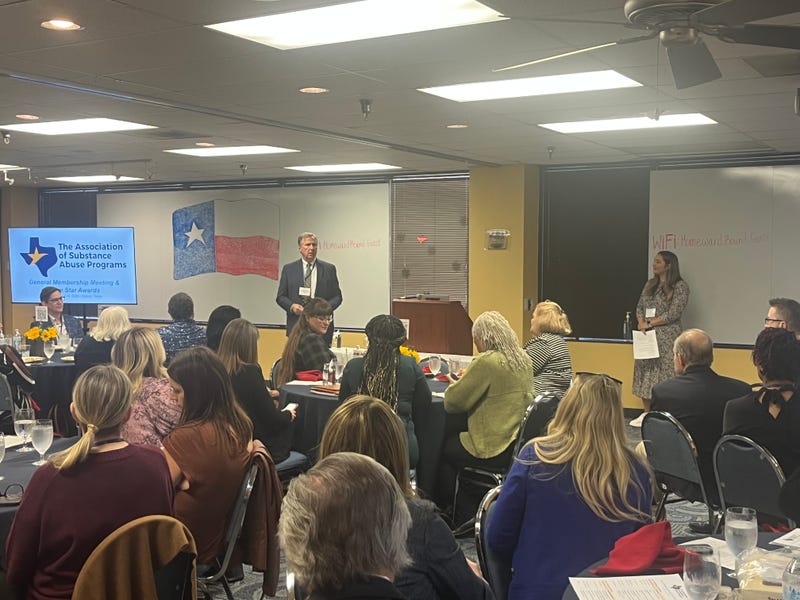
Elected officials and non-profits met in Dallas this week for a meeting on how they can work together on "issues plaguing North Texas." The meeting at the organization, Homeward Bound, included 65 service providers and policy makers to talk about homelessness, drug use and jail overcrowding.
"An event like this allows us to bring providers from all over the state that are struggling with the same issues we're all facing," says Homeward Bound Executive Director Doug Denton. "In this county in particular, we've had crack cocaine, we've had a heroin epidemic, we've had a fentanyl epidemic, and we're on the verge of a methamphetamine epidemic."
Denton says young people have been affected especially hard.
"We're doing everything we can to bring people into treatment, give them services, get them housing," he says. "I want that housing to be safe and sober, so they can start to normalize their lives."
Homeward Bound provides detoxification, crisis response, inpatient and outpatient treatment.
Denton says Homeward Bound also provides peer-to-peer counseling. He says he hired a peer counselor along with a social worker when he launched the non-profit 45 years ago.
"We didn't know what to call them back then, but it was a person with lived experience," he says. "He knew how to talk to folks. He knew how to bring them out of their depression, their substance use, and get them to appropriate 12 step meetings, get them to church if they wanted to go to church."
He says peer counselors are now available 24/7.
Different organizations at the meeting were encouraged to share information and talk about potential strategies to improve public safety, access to care and long-term recovery.
Dallas County Commissioner John Wiley Price says non-profits like Homeward Bound are helping the county jail stay in compliance.
"You can get sanctioned pretty quickly," he says. "Harris County did an extra $50 million just exporting their custody to Louisiana and Mississippi. We're able to do this because we have great partners."
Price says the Dallas County Jail's capacity of about 7,000 people is bigger than many cities in Texas. The Dallas County Criminal Justice Department says 57% of people booked into the jail have a history of receiving state-funded mental health services in the past three years.
"Unfortunately, government facilities have become the cover for what others should be doing, the jail especially," Price says. "It's very costly."
He says an inmate at the jail costs the county about $90 a day, "and that's just not an appropriate facility for anything other than detention." He says non-profits can work to end a cycle of repeat offenders.
"People need services in the community, not in detention and lock-up," Price says.
He says jails are built for detention and don't have the manpower to help with services a non-profit might provide for long-term recovery.
"All they're trying to do is manage day-to-day, 24/7. That is a real undertaking because there has to be a certain amount of care and compassion in terms of managing that population," he says.
Homeward Bound says opioid-related deaths in Dallas County involving fentanyl increased from 11.4% in 2018 to 70.5% in 2022. The organization says about a third of homeless have alcohol or drug problems while two thirds have histories of substance use disorders.
Denton says the organization uses "evidence-based" services to help end a cycle of incarceration.
"We wrap every client in a series of activities, education, counseling and therapy, of working with people who have lived experience who have survived, grown and want to give back," he says.
Denton credits Price, who co-chairs the Dallas County Behavioral Health Leadership Team, with connecting different agencies to help people find a choice of services that might best help them. Denton presented Price with an award from the Association of Substance Abuse Programs.
"When he speaks, we listen. When he speaks, the state listens," Denton says. "We get things done because of Commissioner Price."
